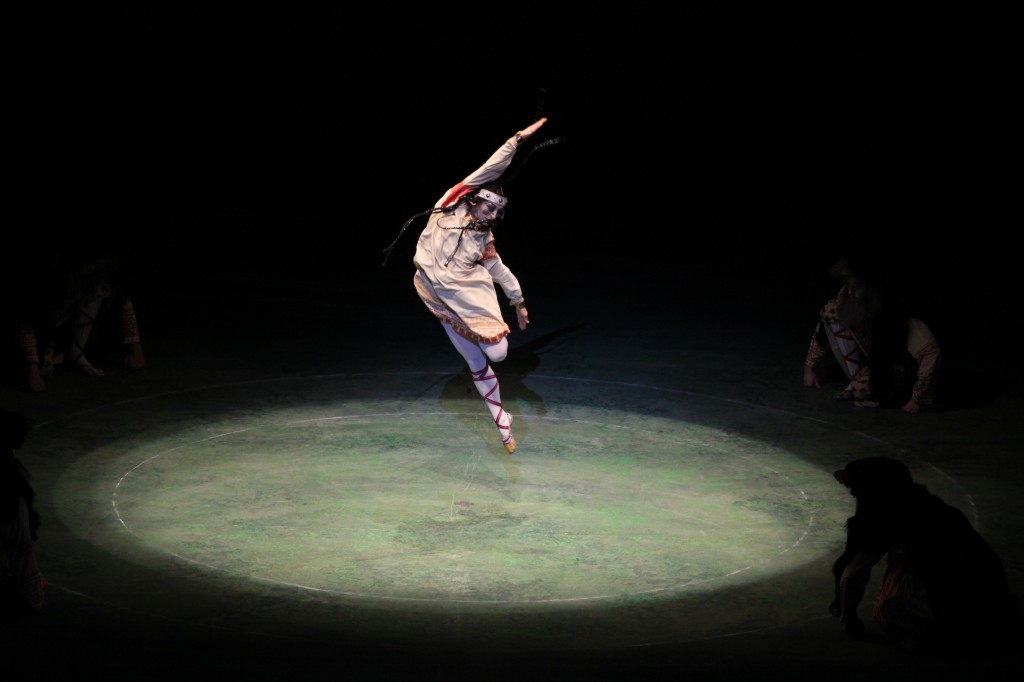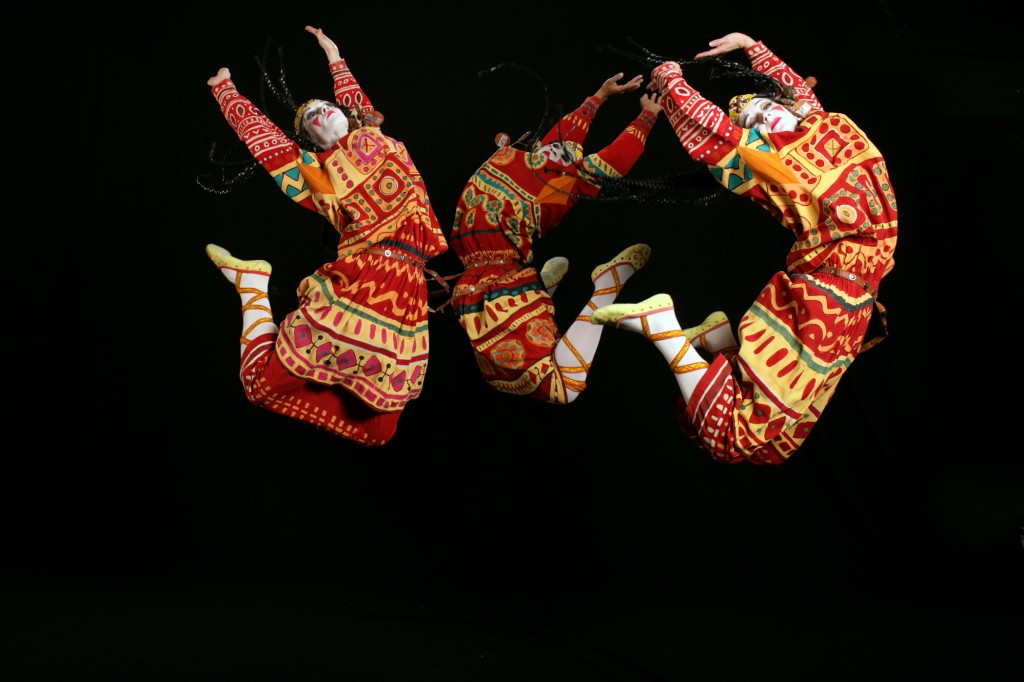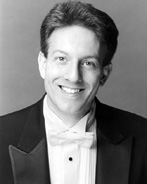
Today we have Conductor Scott Speck with us to talk about the music for the Joffrey’s upcoming “Russian Masters” program. The company will perform Allegro Brillante (Balanchine/Tchaikovsky), Bells (Possokhov/Rachmaninoff), Adagio (Possokhov/Khachaturian) and Nijinsky’s Le Sacre du Printemps (The Rite of Spring) – with music by Stravinsky.
What are some of the particular challenges in preparing the Chicago Philharmonic to play for Joffrey’s upcoming Russian Masters program?
This is a brilliant program, masterfully constructed by the Joffrey’s visionary Artistic Director, Ashley Wheater. I love every piece on the program, both choreographically and musically. Together, these pieces present a number of fascinating challenges. Although all the composers in this program came from roughly the same region of the world, their styles are markedly different. The musicians have to shift gears very quickly from music that is suave, elegant and melodic to music that is dissonant and brutal. In addition to that is the question of endurance: this is a physically taxing program for the musicians, as well as for the dancers. One of our piano soloists, Kuang-Hao Huang, has to play an athletic Tchaikovsky piano concerto, and then shift gears and tackle a set of devilishly difficult Rachmaninoff preludes. All of this takes place in the orchestra pit, of course, and I hope that the audience remembers to pay attention to the feats of athleticism taking place underneath the stage as well as on it.
You will be conducting the music of four different composers that evening; Tchaikovsky, Rachmaninoff, Stravinsky and Khachaturian. Which is the most difficult–and why?
By far our most difficult task — and also the most fun — is preparing Stravinsky’s masterpiece The Rite of Spring. This piece was once considered practically impossible to perform, because it often calls for instruments to play at the extremes of their ranges, with seemingly unpredictable changes in meter. Luckily, the musicians of the Chicago Philharmonic are some of the best in the world; they can do anything. They see this piece as a fun challenge, and I’m sure they will simply tear it up. (In a good way!)
Le Sacre du Printemps (The Rite of Spring) was a very controversial piece when it debuted in 1913 in Paris, danced by Diaghilev’s Ballet Russes company. Nijinsky’s choreography was part of the reason for this, but how did the music contribute to the audience’s reaction?
Controversial is right — the first performance created an actual riot, one of the few in the history of music! I think the music contributed to this chaos in three ways.
First of all, it is dissonant — or more to the point, it is poly-tonal, meaning that it’s in more than one key at a time. You might have one set of instruments playing it E major while another group play in E-flat. Nobody was used to this kind of “harmony” before.
Secondly, the rhythm is unpredictable, and that is very unsettling. Even the wildest, most dissonant rock music usually has a steady beat. But in this piece, the beat sometimes changes in every measure. The result is that unless you know the piece intimately, you never know what the rhythm is going to do next. There’s even a famous section near the beginning of Part One where at least four different meters are competing for the same moment of time. It’s the sonic equivalent of the earth shifting under you feet.
Third, and finally, we have to admit that the first orchestra to play this work, faced with groundbreaking polyrhythms and polytonality, and trying to make sense of a piece that they had never heard before, probably didn’t play it very well. I have heard a recording from a great orchestra of Paris in the 1940s — over thirty years later, with the same conductor (Pierre Monteux) who led the premiere — and it still didn’t sound very good. The musicians have to know what they are trying to express before they can get it across to the audience. Today, our orchestra musicians are so well-versed in this great masterpiece that we will have the opposite challenge: trying to make it sound unfamiliar enough.

How is the music for this ballet historically significant?
Because of the riot itself, the piece will always be historically significant. But there were much more far-reaching ramifications for the history of music. After Stravinsky’s ground-breaking experiment in polytonality and polyrhythm, every other composer of the 1900s had to define himself or herself in relation to this piece. That is, either they decided to continue Stravinsky’s bold experiment, or they decided to reject it and carry on in spite of it. But everybody had to grapple with it; nobody could ignore it. And so The Rite of Spring changed the course of music history. It is hands down the most important piece of the twentieth century.
Because it is difficult to count, dancers sometimes find Stravinsky’s music challenging. As a conductor, is there anything you can do to try and make this easier for them?
The best thing that the orchestra and I can do for the dancers is to be consistent. The dancers have learned to count and memorize these unpredictable rhythms, and they could probably sing the piece note-for-note, at least the sections in which they are dancing. Now my goal is to present this ever-changing landscape to them consistently. It may be a moving target, but if it moves the same way each time, the dancers will have a good chance of hitting it.
Is there a particular section of the ballet that you particularly enjoy?
My favorite section is the last part, the sacrificial dance, in which the Chosen One dances herself to death. This is the section with the trickiest and least predictable rhythms to play — but if you study and practice it a lot (for decades, in my case!), you get into this marvelous groove that you can really feel in your body. This is the most difficult section for the solo dancer as well — she leaps some 90 times in a matter of minutes.
Because of these challenges, both for the dancers and the orchestra, Le sacre du printemps is very rarely performed. And in the reconstruction of the Nijinsky version, it is almost never performed. These will be the Joffrey Ballet’s final performances during this Centennial year, so I urge people not to miss it.
Joffrey’s “Russian Masters” program runs from Sept. 19th to Sept. 22nd at the Auditorium Theatre in Chicago.

With recent performances in London, Paris, Moscow, Beijing, Chicago, San Francisco and Washington, Contributor Scott Speck has inspired international acclaim as a conductor of passion, intelligence and winning personality.
Scott Speck’s recent concerts with the Moscow RTV Symphony Orchestra in Tchaikovsky Hall garnered unanimous praise. His gala performances with Yo-Yo Ma, Itzhak Perlman, Joshua Bell, Midori, Evelyn Glennie and Olga Kern have highlighted his recent and current seasons as Music Director of the Mobile Symphony. This season he also collaborates intensively with Carnegie Hall for the seventh time as Music Director of the West Michigan Symphony. He was recently named Music Director of the Joffrey Ballet; and he was invited to the White House as Music Director of the Washington Ballet.
In recent seasons Scott Speck has conducted at London’s Royal Opera House at Covent Garden, the Paris Opera, Washington’s Kennedy Center, San Francisco’s War Memorial Opera House, and the Los Angeles Music Center. He has led numerous performances with the symphony orchestras of Baltimore, Houston, Chicago (Sinfonietta), Paris, Moscow, Shanghai, Beijing, Vancouver, Romania, Slovakia, Buffalo, Columbus (OH), Honolulu, Louisville, New Orleans, Oregon, Rochester, Florida, and Virginia, among many others.
Previously he held positions as Conductor of the San Francisco Ballet; Music Advisor and Conductor of the Honolulu Symphony; and Associate Conductor of the Los Angeles Opera. During a recent tour of Asia he was named Principal Guest Conductor of the China Film Philharmonic in Beijing.
In addition, Scott Speck is the co-author of two of the world’s best-selling books on classical music for a popular audience, Classical Music for Dummies and Opera for Dummies. These books have received stellar reviews in both the national and international press and have garnered enthusiastic endorsements from major American orchestras. They have been translated into twenty languages and are available around the world. His third book in the series, Ballet for Dummies, was released to great acclaim as well.
Scott Speck has been a regular commentator on National Public Radio, the BBC, the Australian Broadcasting Corporation, and Voice of Russia, broadcast throughout the world. His writing has been featured in numerous magazines and journals.
Born in Boston, Scott Speck graduated summa cum laude from Yale University. There he founded and directed the Berkeley Chamber Orchestra, which continues to perform to this day. He was a Fulbright Scholar in Berlin, where he founded Concerto Grosso Berlin, an orchestra dedicated to the performances of Baroque and Classical music in a historically informed style. He received his Master’s Degree with highest honors from the University of Southern California, served as a Conducting Fellow at the Aspen School of Music, and studied at the Tanglewood Music Center. He is fluent in English, German and French, has a diploma in Italian, speaks Spanish and has a reading knowledge of Russian.
Scott Speck can be reached at www.scottspeck.org




